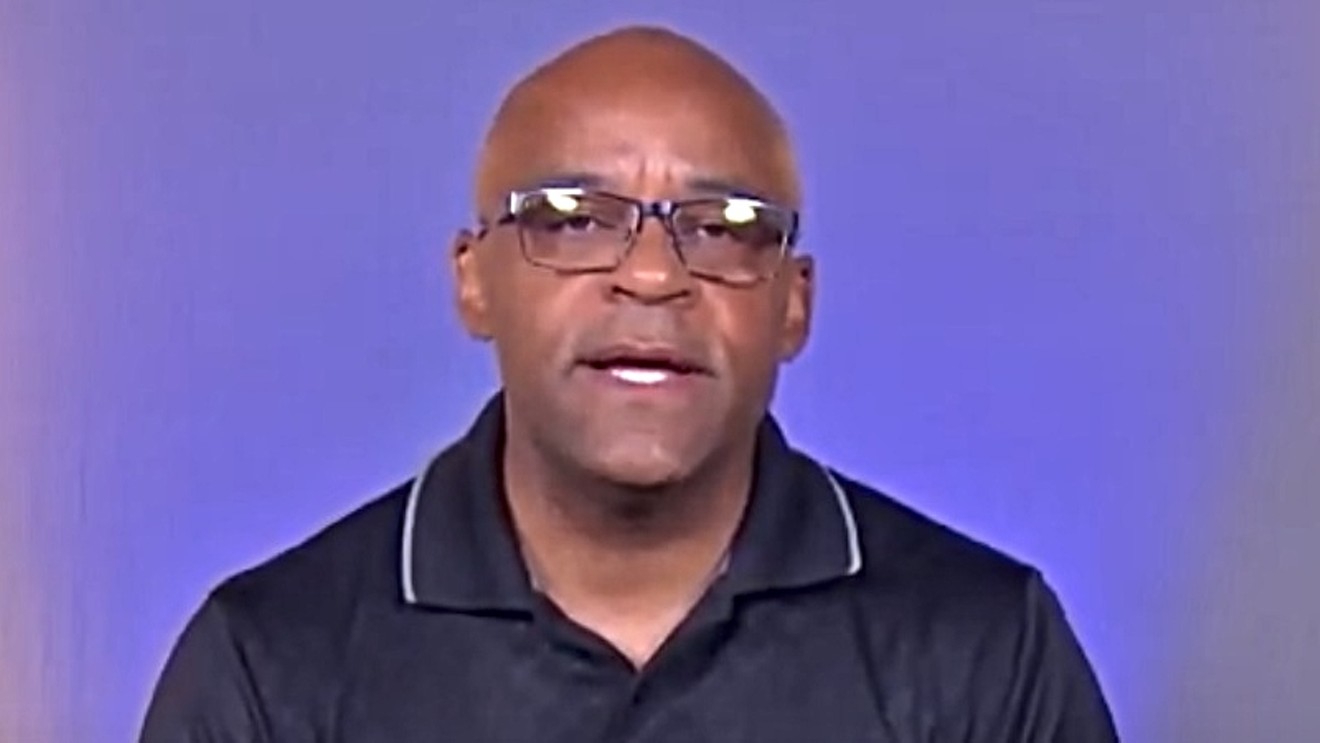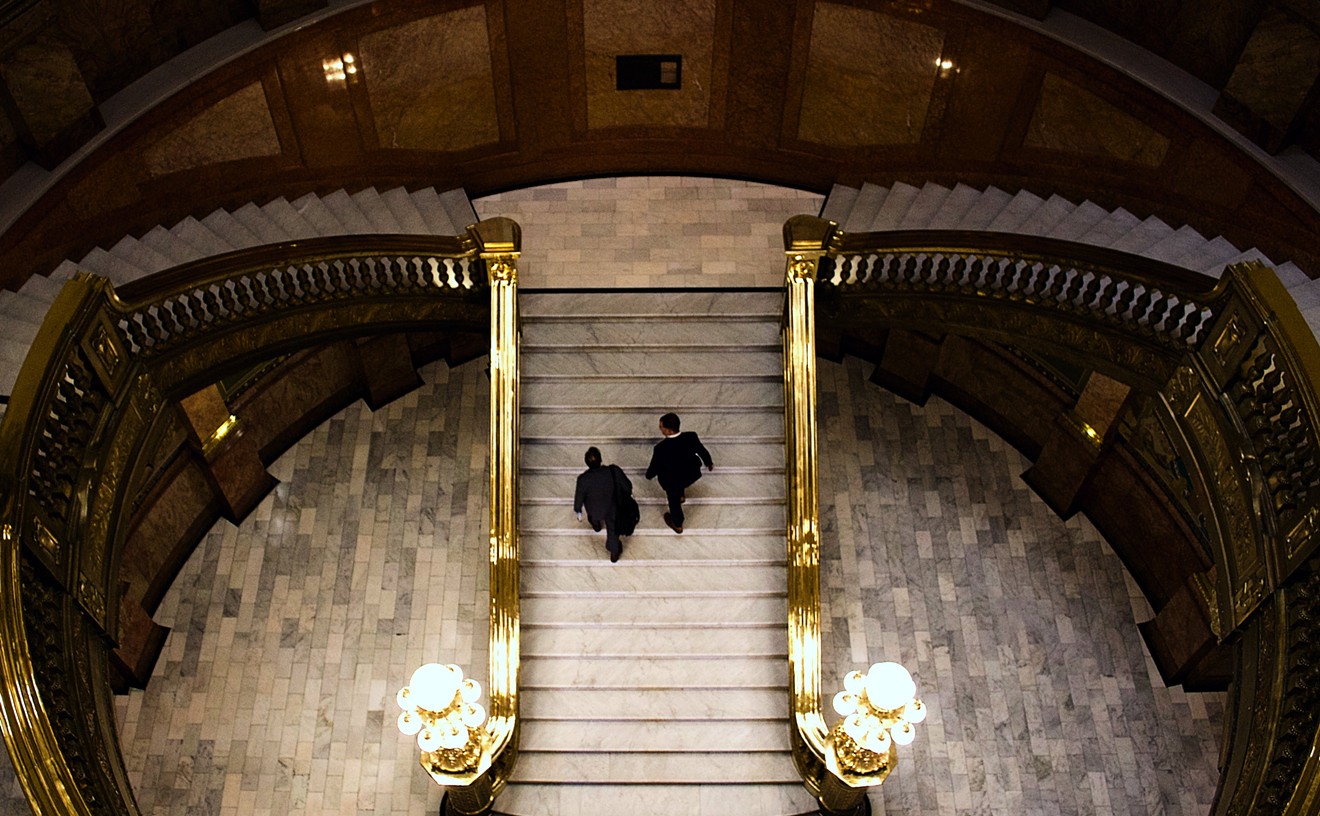During an August 27 press conference updating Denver residents on the battle against COVID-19, Mayor Michael Hancock discussed the possibility of loosening restrictions as a result of improved case data. The city won't be making such requests to state authorities immediately, he stressed, but they may be coming soon.
"If we can stand steady for the next week, we can start discussing variances with the state," Hancock said. But he added that we're "nowhere close" to qualifying for the Protect Our Neighbors stage of Governor Jared Polis's public-health order — a guideline intended to take communities through the hoped-for end of the pandemic. "We still have a lot of work to do," he pronounced.
After introducing Denver Department of Public Health and Environment Executive Director Bob McDonald and Office of Emergency Management Executive Director Matt Mueller, Hancock thanked the people of Denver for "staying the course over the past several weeks to bring down the spike in cases that happened over the month of July." This achievement was especially important, he added, because "we have our kids going back to school — and I'm excited to see that Denver Public Schools will bring their youngest learners [participants in DPS's early childhood education program] back to the classroom starting on September 8."
According to Hancock, Denver authorities will be closely monitoring elementary and secondary schools, as well as post-secondary facilities. "We've seen what's happened in other states, particularly in regard to college campuses," he noted. "And we're aware we're about to go into our Labor Day weekend. While we usually look forward to our end-of-the-summer celebrations, we can't celebrate this year like we usually do." But if community members continue to follow best practices such as mask usage, social distancing and the like, he predicted, "we're going to be able to see fans in the stands for our sports teams. I'm looking forward to seeing a Broncos game in person."
Hancock spoke in general terms about the COVID-19 data. "Our hospitalization rates remain low and flat," he said. "Our ICU capacity is stable. Our percent positivity rate is still in good shape — much better than we saw in the month of July. And the rate of new cases has been steadily declining for the past month." To continue making progress in these areas, he suggested that the city will keep "ramping up testing efforts" by offering the types of services now associated with the Pepsi Center site at multiple locations in local neighborhoods.
According to McDonald, Denver is currently seeing around fifty new COVID-19 cases per day. Testing turnaround times are generally back down to a couple of days, he said, and contact tracers with Denver Health are now getting in touch with possibly infected folks within 24 hours around 90 percent of the time. Moreover, hospitals are less in danger of being overwhelmed because an increasing number of those being diagnosed are in a younger demographic — people in the 25-30 category who are less likely to wear masks. McDonald said that this was particularly true of young men, whom he encouraged to don facial coverings more often to prevent the currently flattened curve from arcing upward again.
The age range of COVID-19 patients is likely to drop even further with kids going back to school, McDonald continued — but he noted that cold-and-flu season will probably bring more complications. Since those viruses tend to spread more quickly in colder weather, he surmised that the novel coronavirus could behave in a similar fashion.
During Mueller's turn, he spoke about a long-term recovery action plan that Denver officials have developed and posted on the city's website. He stressed that it's a "living document.... As the recovery needs change, the plan will adapt to the changes."
When Hancock returned to the mic, he addressed one of the most frequent questions he receives: How long will windows in buildings in and around Civic Center Park that were damaged during protests remain boarded up? Because many of the structures are national historic sites, he explained, replacing the shattered glass isn't as simple as making an order from Home Depot or Lowe's; a complex series of steps must be followed. The windows aren't cheap, either; Hancock mentioned a price tag of $3,150 apiece. Until the windows are replaced, the city has made arrangements with DPS and, specifically, the Denver School of the Arts for students to paint the boards with designs intended to show their pride in the city; more information about that should be coming soon.
Another question posted to the mayor involved rumors that Polis will issue new guidelines for indoor events tomorrow, August 28. Hancock didn't confirm that such an edict is coming, but he emphasized how important even modest gatherings — groups in the tens, as opposed to the thousands — are to the hotel and venue industries. In his words, the city wants to help such businesses "get back into the game. But we want to return in a good way — be smart about making sure people can socially distance and follow strict protocols to keep everybody safe. It's critical for our economy."
[
{
"name": "Air - MediumRectangle - Inline Content - Mobile Display Size",
"component": "12017618",
"insertPoint": "2",
"requiredCountToDisplay": "2"
},{
"name": "Editor Picks",
"component": "17242653",
"insertPoint": "4",
"requiredCountToDisplay": "1"
},{
"name": "Inline Links",
"component": "18838239",
"insertPoint": "8th",
"startingPoint": 8,
"requiredCountToDisplay": "7",
"maxInsertions": 25
},{
"name": "Air - MediumRectangle - Combo - Inline Content",
"component": "17261320",
"insertPoint": "8th",
"startingPoint": 8,
"requiredCountToDisplay": "7",
"maxInsertions": 25
},{
"name": "Inline Links",
"component": "18838239",
"insertPoint": "8th",
"startingPoint": 12,
"requiredCountToDisplay": "11",
"maxInsertions": 25
},{
"name": "Air - Leaderboard Tower - Combo - Inline Content",
"component": "17261321",
"insertPoint": "8th",
"startingPoint": 12,
"requiredCountToDisplay": "11",
"maxInsertions": 25
}
]












